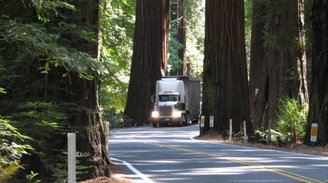
The Humboldt Area Center for Harm Reduction | Screenshot Google Street View
After the Eureka City Council voted 3-2 earlier this month to temporarily ban syringe exchange programs within city limits, the council will again revisit the issue and consider allowing for the operation of mobile syringe exchange programs (SEPs) during the pandemic.
The council — now with two new members, Kati Moulton and Scott Bauer — will discuss the issue during a special meeting on Tuesday, Jan. 5. If the council approves, city staff would amend the city’s Declaration of a Local Emergency related to the pandemic to allow for mobile syringe exchange programs while the emergency continues.
The Humboldt Area Center for Harm Reduction (HACHR) — which has operated the syringe exchange in Eureka for years — and the city already tried to reach an agreement that would have required the nonprofit to move to a mobile only exchange by June, but some council members felt that this was not soon enough and decided that it would be best to suspend these services until the city could rewrite the rules governing SEPs.
Since the ban became effective on Dec. 16, HACHR has continued to provide syringe exchange outside of the city by home delivery, and continued to provide its other harm reduction services at its Third Street facility. The nonprofit did announce a plan to set up a mobile exchange just outside of Eureka city limits, but quickly backed away from that plan after learning it was not permitted by its state authorization.
HACHR condemned the council’s decision, saying that prohibiting SEPs would have devastating effects on the health of the non-profit’s participants, especially in the midst of the COVID-19 pandemic. And although the Department of Health and Human Services (DHHS) —not subject to city jurisdiction — has continued to operate a syringe exchange in Eureka, HACHR staff says that this program alone would not be able to serve as many people.
And the council seems to agree that it is not an ideal time for Eureka to have less syringe services available. Though Councilmembers Kim Bergel, Heidi Messner and Austin Allison (Allison and Messner have both since ended their terms on council) voted to temporarily ban HACHR’s syringe exchange in the city, they have all voiced support for the program, saying that the decision was based on the city’s history with the nonprofit and the neighbor’s complaints about the Third Street location.
###
After continuing its discussion on mobile syringe exchange programs, the Eureka City Council will vote, again, to adopt an ordinance banning camping in certain areas and during daylight hours in the city. The ordinance will replace the city’s existing anti-camping ordinance to bring the city into compliance with a court ruling on city camping bans.
The council already voted 4-1 to adopt the ordinance during its Dec. 1 meeting. But, according to the staff report, the vote was ineffective “due to a technical error on the posted agenda.”
Some changes have also been made to the ordinance since that meeting, including reducing the fines to $25, $35, and $50 for first, second, and third offenses occurring within one year.
Advocates for the houseless are urging people to show up to the meeting, in the hopes that the council will reconsider its vote entirely. You can find more information in this press release from the Legal Services of Northern California.
###
In other business, the council will consider handing out $300,000 in grant money to small business owners through the Eureka Small Business Bridge Program. This program would provide applicants with up to $7,500 to cover rent unpaid due to the pandemic.
Nonprofit or for profit businesses in the City of Eureka can apply if they have seen a 20 percent or more reduction in revenue and/ or a 20 percent reduction of staffing or hours, have 10 or fewer full-time employees, and have been in business since March 1, 2020.
You can find more information on the requirements and how to apply here.
###
The council will also discuss the contentious topic of Caltrans’ Richardson Grove Improvement Project. The project, which has been delayed multiple times over the last decade by litigation from environmental groups, proposes to realign and widen a 1.1 mile stretch of Highway 101 through the state park.

File photo from Caltrans
The main purpose of the proposed construction is to allow industry-standard trucks to pass through the area, something currently prohibited because of the dangerously sharp curves on that section of highway. Anticipating that this may mean more commercial trucks would pass through Eureka, the council requested that staff give a presentation on the potential traffic impacts of the project on the City.
According to the staff report, Caltrans issued a Finding of No Significant Impact (FONSI), which states that “the preferred alternative will have no significant impact on the human environment,” and finding that “The total number of trucks would not be likely to change regardless of truck size for routine, regular truck trips.”
The Eureka City Council special meeting is scheduled for Tuesday, Jan. 5 at 5:00 p.m. You can view the full agenda and directions on how to participate here.
The regular meeting will follow at 6:00 p.m. you can view the full agenda and directions on how to participate here.
CLICK TO MANAGE